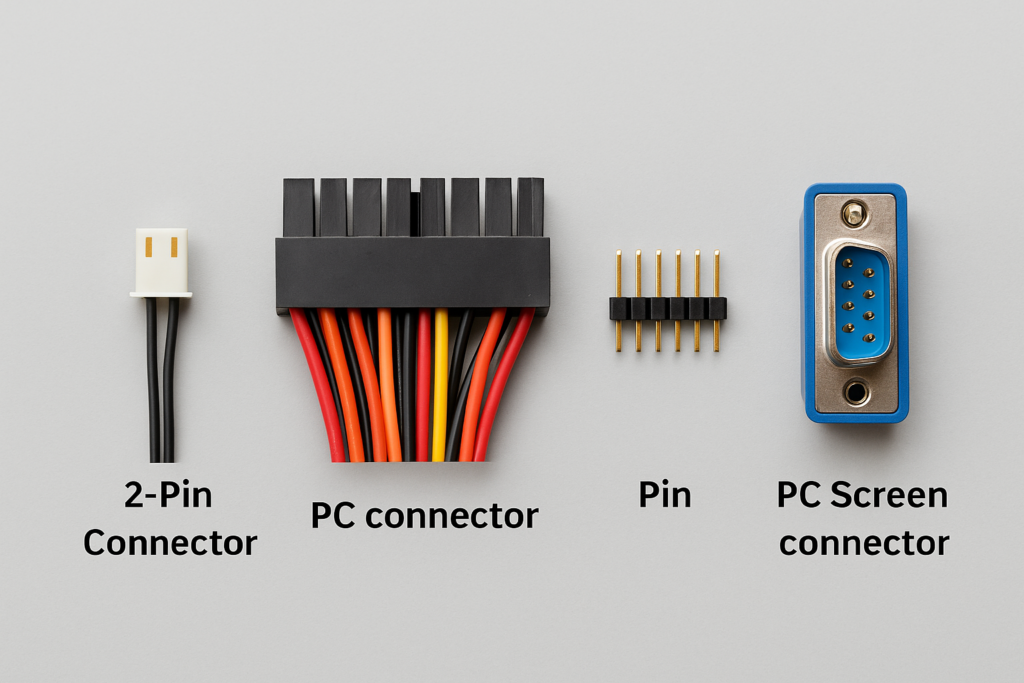
Introduction
Connectivity forms the foundation of every electronic and computer system. Without reliable connectors, even the most advanced devices would fail to function seamlessly. From everyday laptops and desktop computers to industrial machinery and communication systems, connectors ensure secure, efficient, and durable electrical connections. Among these, pin connectors, PC connectors, 2 pin connectors, and PC screen connectors play vital roles. This blog explores their importance, applications, and why they remain indispensable in both consumer electronics and industrial systems.
What Are Pin Connectors?
Pin connectors are electrical connectors that use metal pins to establish contact between devices or circuits. They can be single-pin or multi-pin, depending on the requirement. Commonly found in printed circuit boards (PCBs), microcontrollers, sensors, and cable assemblies, pin connectors are valued for their compact design and reliable performance.
These connectors often feature gold or tin plating to ensure low contact resistance and protection against corrosion—an essential requirement in high-performance electronic circuits.
PC Connectors: The Heart of Computer Interfaces
PC connectors refer to the wide range of connectors found inside and outside personal computers. These include USB ports, VGA, HDMI, SATA, and audio jacks. However, one of the less obvious but equally important categories are the internal connectors—such as power supply connectors, motherboard headers, and pin connectors that connect various components together.
For example:
- 24-pin ATX connectors provide power to the motherboard.
- USB header pin connectors link front-panel USB ports to the board.
- Fan pin connectors regulate cooling systems inside PCs.
Without these connectors, it would be impossible to achieve the modular design that modern PCs rely on for upgradability and repair.
Understanding 2 Pin Connectors
2 pin connectors are among the simplest yet most widely used connector types in electronics. With just two terminals, they are ideal for applications that require straightforward connections such as DC power supply, LED strips, sensors, and battery connections.
In PCs and consumer electronics, 2 pin connectors are often used for power buttons, reset switches, or speaker connections on motherboards. Their simplicity and durability make them suitable for low-voltage applications while ensuring easy installation.
PC Screen Connectors: Displaying the Bigger Picture
When it comes to visuals, PC screen connectors play a crucial role. These connectors link monitors to computer systems, ensuring smooth data transmission for high-quality display output. Common types include:
- VGA (Video Graphics Array): Analog connector still found in older systems.
- HDMI (High-Definition Multimedia Interface): The most common digital connector supporting both video and audio.
- DisplayPort: Widely used in high-performance PCs for higher resolution and refresh rates.
- DVI (Digital Visual Interface): Common in older gaming and workstation PCs.
Internally, screen connectors may also include LVDS (Low-Voltage Differential Signaling) and eDP (embedded DisplayPort) connectors for laptop screens. Each type ensures that visuals are transmitted accurately, supporting tasks ranging from simple office work to gaming and design.
Importance of Connectors in Electronics
Signal Integrity
Reliable connectors prevent data loss, distortion, or noise, which is critical in PC connectors used for audio, video, and high-speed data transfer.
Modular Design
Connectors allow systems to be upgraded and repaired easily. For instance, replacing a PC screen connector or attaching a new graphics card through pin connectors is straightforward.
Power Distribution
From 2 pin connectors in LEDs to 24-pin ATX connectors in PCs, these components ensure power is delivered where it is needed.
Durability and Safety
Plated pin connectors resist wear and oxidation, ensuring safe and long-term operation of sensitive electronic equipment.
Applications Across Industries
- Consumer Electronics
- Used in PCs, laptops, gaming consoles, smartphones, and monitors.
- Industrial Automation
- Pin connectors connect sensors, controllers, and relays in automation systems.
- Telecommunications
- PC connectors are integral in routers, servers, and network hubs.
- Medical Electronics
- 2 pin connectors are used in battery-powered diagnostic devices.
- Automotive Systems
- PC screen connectors enable infotainment displays and dashboard modules.
Advantages of Using Pin, PC, and Screen Connectors
- Compact Design: Saves space in crowded PCBs and enclosures.
- Reliable Contact: Ensures stable current and signal transmission.
- Versatile Applications: Suitable for power, signal, and data transfer.
- Scalability: Available in multiple sizes and pin counts for diverse needs.
- Ease of Use: Plug-and-play nature simplifies installation and replacement.
Future of Connectors in Electronics
As technology evolves, connectors are becoming smaller, faster, and more reliable. Future pin connectors and PC connectors will support higher bandwidths, faster charging, and miniaturized electronic assemblies.
With the rise of 5G, AI-driven devices, and IoT applications, connectors must adapt to handle increased data flow while maintaining durability. Similarly, PC screen connectors are evolving to support ultra-high-definition displays, virtual reality, and multi-monitor setups.
Sustainability is another key focus, with manufacturers developing connectors from recyclable materials and incorporating designs that support longer product lifecycles.
Conclusion
From the simplest 2 pin connectors to advanced PC screen connectors, connectivity remains the cornerstone of electronics and computing. These connectors not only enable power delivery and signal transmission but also support the modular, upgradeable nature of modern PCs and electronic systems.
Whether in consumer devices, industrial automation, or telecommunication systems, connectors ensure that every circuit works seamlessly. As electronics continue to advance, the role of pin connectors, PC connectors, 2 pin connectors, and PC screen connectors will only become more critical in shaping the reliability and performance of future technologies.
